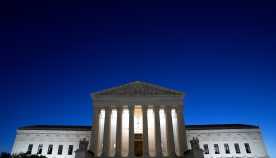About Us


We have seen a steady stream of litigation challenging the constitutionality and authority of federal agencies created to protect consumers, such as the Consumer Financial Protection Bureau (CFPB) and the Federal Trade Commission (FTC). See, e.g., Consumer Fin. Prot. Bureau v. Cmty. Fin. Servs. Ass’n of Am., Ltd., 601 U.S. 416 (2024) (upholding constitutionality of CFPB’s funding mechanism under appropriations clause); Seila Law v. CFPB, 591 U.S. 197 (2020) (holding that CFPB’s single-director leader who is removable only for inefficiency, neglect, or malfeasance violates separation of powers); AMG Capital Management v. FTC, 593 U.S. 67 (2021) (holding FTC authority under the FTC Act does not grant it the right to seek equitable monetary relief). While the constitutional challenges have had varied results, two Supreme Court cases from last term are likely to lead to an increase in litigation challenging agencies’ authority to protect consumers. Loper Bright Enters. v. Raimondo, 144 S. Ct. 2244 (2024); Corner Post, Inc. v. Bd. of Governors of Fed. Reserve Sys., 144 S. Ct. 2440 (2024).
Challenges to Agency Authority to Protect Consumers
Many federal consumer protection laws are at risk of challenge in light of the Supreme Court’s decision in Loper Bright, which overturned Chevron USA v. National Resources Defense Council, 467 U.S. 837 (1984). The Chevron doctrine instructed a reviewing court to defer to an agency’s “permissible” interpretation of an ambiguous statute, rather than “substitute its own construction of a statutory provision for a reasonable interpretation made by the administrator of an agency.” Id. at 844. Now, under Loper Bright, courts may not presume that agencies are entitled to such deference. Instead, courts must determine the “best” reading of a statute. Loper Bright, 144 S. Ct. at 2266. “Agencies have no special competence in resolving statutory ambiguities,” the Court reasoned, “[c]ourts do.” Id.
The Supreme Court has also opened the door to increased challenges to agency actions. In another case, Corner Post v. Board of Governors of the Federal Reserve System, 144 S. Ct. 2440 (2024), the Court held that the default statute of limitations period for Administrative Procedure Act (APA) challenges begins to run when a plaintiff is injured by the agency action. Therefore, a cause of action may accrue many years after the publication of a regulation, such as when a new company enters the industry and first becomes subject to a decades-old regulation. One can expect an uptick in the number of challenges to consumer protection and other rules and regulations, some of which may reach the Supreme Court. For example, pursuant to its authority under Section 18 of the FTC Act, 15 U.S.C. § 57a, the FTC proposed a rule prohibiting certain businesses from misrepresenting the total costs of goods and services by omitting mandatory fees from advertised prices or misrepresenting the nature and purpose of fees. Trade Regulation Rule on Unfair or Deceptive Fees, 88 Fed. Reg. 77420 (proposed Nov. 9, 2023) (to be codified at 16 C.F.R. pt. 464). Although the rule is not yet final, businesses are already challenging the proposed rule in the administrative process, and a finalized rule would likely face protracted litigation that could land it in the Supreme Court.
Similarly, a recent CFPB rule is already facing such challenges. The CFPB promulgated a rule that reduced the amount of late fees that credit card companies could charge in certain situations. CFPB Bans Excessive Credit Card Late Fees, Lowers Typical Fee from $32 to $8 (Mar. 5, 2024). The CFPB estimates that the rule will result in average savings of $220 per year for the more than 45 million people who are charged late fees. Id. The Chamber of Commerce challenged the rule, arguing that the CFPB exceeded its authority under the Credit Card Accountability, Responsibility, and Disclosure Act in promulgating the rule and that CFPB is unconstitutionally funded. Compl. Chamber of Com. of United States v. Consumer Fin. Prot. Bureau, No. 4:24-CV-00213-P (N.D. Tex. Mar. 7, 2024). Although a recent Supreme Court case foreclosed the latter argument, the case will proceed to trial on the former issue and could eventually find its way to the Supreme Court. Chamber of Com. of United States v. Consumer Fin. Prot. Bureau, No. 4:24-CV-00213-P, at *1 (N.D. Tex. May 28, 2024).
Arbitration
Pre-dispute mandatory binding arbitration clauses in contracts are ubiquitous. These clauses require signatories to seek redress through arbitration rather than the courts and can limit access to remedies. Consumers often are not aware of these clauses at the time of purchase and only become aware when a dispute arises. The Federal Arbitration Act (FAA) requires courts to enforce these clauses to the same extent, “but not more so,” as any other contract. Morgan v. Sundance, Inc., 596 U.S. 411, 418 (2022) (explaining that the FAA forbids courts from adopting arbitration-specific rules); see also 9 U.S.C. § 2 (enforceability of arbitration provision in maritime transactions).
Now pending before the California Supreme Court is the question of whether an arbitration agreement between a car dealer and a consumer can bind a consumer for warranty claims against the manufacturer. In Ochoa v. Ford Motor Company, 89 Cal. App. 5th 1324 (2023), the California Court of Appeals denied Ford Motor Company’s motion to compel arbitration of the plaintiffs’ claims for alleged manufacturing defects. It held that the consumers could not be bound to arbitrate based on their agreements with the dealer because the manufacturer was not a signatory to the contract and there were no equitable or legal principles that would permit the manufacturer, as a nonparty to the contract, to compel arbitration. The outcome of this case will likely be determined in light of recent Supreme Court precedent under the FAA. Ford Motor Warranty Cases, 532 P.3d 270 (Cal. 2023). The Supreme Court’s keen interest in arbitration rulings over the past decade suggests this issue may reach the high court.
Student Loan Debt
Two separate lawsuits, brought by groups of Attorneys General, are challenging the U.S. Department of Education’s revised student loan forgiveness plans. The rule at issue, called the SAVE Plan, provides a faster path toward loan cancellation and reduces monthly income-based repayments for an estimated 8 million borrowers. Improving Income Driven Repayment for the William D. Ford Federal Direct Loan Program and the Federal Family Education Loan Program, 88 Fed. Reg. 43820 (July 10, 2023) (to be codified at 34 CFR pts. 682 and 685).
In one case, a Missouri court partially granted and partially denied motions to block the Education Department from implementing the new rule. Missouri v. Biden, No. 4:24-cv-00520-JAR (D. Mo. June 24, 2024). The court determined that the Secretary of Education was not authorized by Congress to forgive loan balances as spelled out in the rule; the court halted additional loan forgiveness, but left the income-driven repayments portion of the rule in effect. Id. However, on appeal, the Eighth Circuit granted a request for an administrative stay of the remainder of the rule, halting the entirety of the rule. Missouri v. Biden, No. 24-2332 (8th Cir. July 18, 2024) (mem.). In the other case, a Kansas court enjoined implementation of the rule in its entirety. Alaska v. U.S. Dep’t of Education, No. 6:24-cv-01057-DDC-ADM (D. Kan. June 24, 2024). However, the Tenth Circuit reversed and stayed the injunction, allowing the rule to go into effect. Alaska v. U.S. Dep’t of Education, No. 24-308 (10th Cir. June 30, 2024) (mem.) (per curiam). The plaintiffs filed an emergency application with Supreme Court seeking to vacate the Tenth Circuit’s stay decision. Regardless of how the Court handles that application, it is likely that one or both of these cases eventually reaches the Supreme Court to decide on the merits.
Julie Nepveu, JNepveu@aarp.org
Allie Horwitz, AHorwitz@aarp.org
View the Full Supreme Court Preview

















